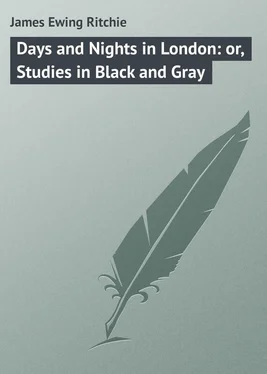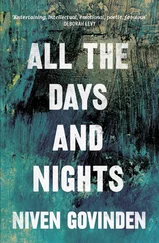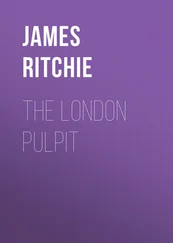James Ritchie - Days and Nights in London - or, Studies in Black and Gray
Здесь есть возможность читать онлайн «James Ritchie - Days and Nights in London - or, Studies in Black and Gray» — ознакомительный отрывок электронной книги совершенно бесплатно, а после прочтения отрывка купить полную версию. В некоторых случаях можно слушать аудио, скачать через торрент в формате fb2 и присутствует краткое содержание. Жанр: foreign_prose, на английском языке. Описание произведения, (предисловие) а так же отзывы посетителей доступны на портале библиотеки ЛибКат.
- Название:Days and Nights in London: or, Studies in Black and Gray
- Автор:
- Жанр:
- Год:неизвестен
- ISBN:нет данных
- Рейтинг книги:3 / 5. Голосов: 1
-
Избранное:Добавить в избранное
- Отзывы:
-
Ваша оценка:
- 60
- 1
- 2
- 3
- 4
- 5
Days and Nights in London: or, Studies in Black and Gray: краткое содержание, описание и аннотация
Предлагаем к чтению аннотацию, описание, краткое содержание или предисловие (зависит от того, что написал сам автор книги «Days and Nights in London: or, Studies in Black and Gray»). Если вы не нашли необходимую информацию о книге — напишите в комментариях, мы постараемся отыскать её.
Days and Nights in London: or, Studies in Black and Gray — читать онлайн ознакомительный отрывок
Ниже представлен текст книги, разбитый по страницам. Система сохранения места последней прочитанной страницы, позволяет с удобством читать онлайн бесплатно книгу «Days and Nights in London: or, Studies in Black and Gray», без необходимости каждый раз заново искать на чём Вы остановились. Поставьте закладку, и сможете в любой момент перейти на страницу, на которой закончили чтение.
Интервал:
Закладка:
“Don’t you think,” said the manager of one of the theatres most warmly patronised by the working classes, to a clerical friend of mine, “don’t you think I am doing good in keeping these people out of the public-houses all night?”
My clerical friend was compelled to yield a very reluctant assent. In the case of the music-hall nothing of the kind can be said in extenuation. It is only a larger and handsomer and more attractive kind of drinking shop. In one respect it may be said to have an advantage. Mostly of a night, about the bars of common public-houses and gin-palaces, there are many unfortunate women drinking either by themselves or with one another, or with their male companions. In the music-hall “the unfortunate female” element – except in the more central ones, where they swarm like wolves or eagles in search of their prey – is absent, or, at any rate, not perceptible. The workman takes there his wife and family, and the working man the young woman with whom he keeps company. There can be no harm in that? you say. I am not quite sure. Let me give one case as an illustration of many similar which have come under my own observation.
A girl one evening went with a friend, an omnibus conductor, to a music-hall. She was well plied with drink, which speedily took an effect on her brain, already affected by the gas and glare, and life and bustle of the place. The girl was a fine, giddy, thoughtless girl of the maid-of-all-work order. In the morning when she awoke she found herself in a strange room with her companion of the preceding night. What was the result? She dared not go back to her place. She was equally afraid to go home. I need not ask the reader to say what became of her. Let him question the unfortunate women who crowd the leading thoroughfares of a night how they came to be what they are. It is a fact, I believe, that no censorship is applied to music-hall performances, and that the only censorship is that of the audience. The audience, be it remembered, begins to drink directly the doors are opened, and remains drinking all the time till they are closed; and you may be sure that in a mob of two, or sometimes, as is the case, three thousand people, that the higher is the seasoning and the lower the wit, and the more abundant the double entendre , the greater is the applause, and the manager, who sits in an arm-chair at the back of the orchestra and in front of the audience, takes note of that. In the days of the Kembles, Mrs. Butler notes how the tendency of actors was not so much to act well as to make points and bring down the house. Especially does she deplore Braham’s singing as much to be censured in this respect, and as unworthy of his high powers and fame. In the music-hall this lower style of acting and singing becomes a necessity. The people go to be amused, and the actor must amuse them. If he can stand on his head and sing, immense would be the applause. If he is unequal to this, he must attempt something equally absurd, or he must have dogs and monkeys come to his aid; and perhaps after all he will find himself outrivalled by a Bounding Brother or a wonderful trapeze performer. If the music-hall proprietor in a northern city had prevailed on Peace’s mistress, Miss Thompson, to have appeared on his stage, what a fortune he would have made.
The other night I went into one of the largest of our music-halls, not a hundred miles away from what was once Rowland Hill’s Chapel. There must have been more than three thousand people present. Not a seat was to be had, and there was very little standing room. I paid a shilling for admission, and was quite surprised to see how entirely the shilling seats or standing places were filled with working men, many of whom had their wives and sweethearts with them. The majority, of course, of the audience was made up of young men, who, in the course of the evening spent at least another shilling in beer and “baccy.” In these bad times, when people, in the middle ranks of life are in despair at the hard prospect before them, here were these working men spending their two hundred pounds a night at the least at this music-hall.
When I managed to squeeze my way in it was about the hour of ten, when men who have to get up early to work ought to be in bed. The performances were in full swing, and the enthusiasm of the audience, sustained and stimulated by refreshment, was immense. A female or two were the worse for liquor, but otherwise by that time the intoxicating stage had not been gained. After some very uninteresting bicycling by riders in curious dress, a man disguised as a nigger sang a lot of low doggerel about his “gal.” In the course of his singing he stopped to tell us that his “gal” had a pimple and that he liked pimples, as they were signs of a healthy constitution. He then, amidst roars of laughter, pretended to catch a flea. He liked fleas, he said; a flea came in the daylight and looked you in the face like a man as it bit you; but a bug he hated. It crawled over your body in the dark and garroted you. Then he went on to speak in a mock-heroic style of the rights of women. He “spotted” some naughty ones present – an allusion received with laughter. He loved them all, male or female, married or single, and advised all the young men present to get married as soon as possible and then hang themselves. Ballet dancing of the usual character followed, and I came away.
It is said a paper recently sent a special correspondent to describe a London music-hall; the description was refused admission into the paper on the ground of indecency, and I can well believe it.
As to the profit made by the music-halls there can be no doubt. Take for instance the London Pavilion. I find the following newspaper paragraph: Sir Henry A. Hunt, C.B., the arbitrator in the case of the London Pavilion Music Hall, has sent in his award. M. Loibl claimed £147,000 for the freehold and goodwill, the building being required for the new street from Piccadilly to Oxford Street. The award is £109,300. The freehold cost M. Loibl £8,000, and his net profits in 1875 were £10,978; in 1876, £12,083; and in 1877, £14,189. Let me give another illustration. When the proprietor of Evans’ Supper Rooms was refused his license, his loss was estimated at £10,000 per annum. It surely evidently is more ready to pay liberally for the gratification of its senses, than for the promotion of its virtues.
IV. – MORE ABOUT MUSIC-HALLS
The journeyman engineer tells us one day as he was walking along with a mate in the country, he spoke of the beauty of the surrounding scenery and of the magnificent sight which met their eyes. “Oh, blow the sights of the scenery,” said his companion, “the sight for me is a public-house.” It is the same everywhere. I was once travelling in a third-class carriage from Newry to Belfast, when I heard the most atrocious exclamations from a party of young men seated at the other end, all offering to break each other’s heads in the name of the Holy Father. On my intimating that it was a pity young men should thus get into that state to a respectable farmer by my side, his only reply was, “Sure, what’s the good of a drop of drink if it don’t raise something?” Once upon a time I spent a Sunday in a little village inn in North Wales. To my disgust there stumbled into the little parlour a young man, dressed respectably, who had evidently been heavily drinking. As he lay there with his stertorous snore, all unconscious of the wonder and the beauty of the opening day, it seemed to me that it was a sad misuse of the term to say, as his friends would, that he had been in search of amusement. As a reverend divine took his seat in a train the other day there stumbled into it a couple of young fellows, one with his face very much bruised and cut about – who soon went off to sleep – while his companion explained to the minister that they had both of them been enjoying themselves. In the more densely populated and poorer districts of the metropolis there is an immense deal of this kind of enjoyment.
Читать дальшеИнтервал:
Закладка:
Похожие книги на «Days and Nights in London: or, Studies in Black and Gray»
Представляем Вашему вниманию похожие книги на «Days and Nights in London: or, Studies in Black and Gray» списком для выбора. Мы отобрали схожую по названию и смыслу литературу в надежде предоставить читателям больше вариантов отыскать новые, интересные, ещё непрочитанные произведения.
Обсуждение, отзывы о книге «Days and Nights in London: or, Studies in Black and Gray» и просто собственные мнения читателей. Оставьте ваши комментарии, напишите, что Вы думаете о произведении, его смысле или главных героях. Укажите что конкретно понравилось, а что нет, и почему Вы так считаете.












